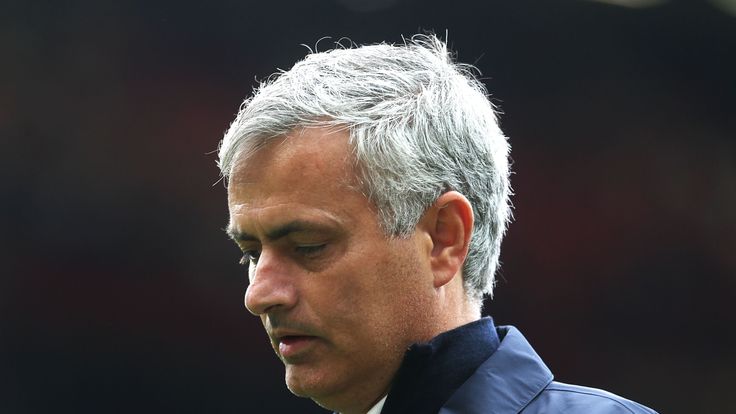
Thursday 8 December 2016 12:28, UK
With Manchester United losing yet another lead late on against Everton last weekend, Adam Bate assesses a recurring issue for Jose Mourinho.
When Marcus Rashford knocked in a late, late winner at Hull in August, raucous celebrations ensued among the Manchester United travelling support. Marouane Fellaini even had to help a woman who was crushed as the fans rushed to celebrate. Excitement always greets a dramatic winner but this was a goal that was seen as heralding a return to the United of old.
"I'm more than happy to say that we won in 'Fergie Time'," said Jose Mourinho afterwards in reference to the club's knack of snatching stoppage-time goals during Sir Alex Ferguson's reign at Old Trafford. As the Manchester Evening News put it that day: "This isn't a Reds side any more who'll sag when the going gets tough."
However, a little over three months on and that's exactly what United continue to do. Instead of getting a taste for late winners under Mourinho and becoming a team who punish others in the dying moments, they are the ones who continue to fall victim to game-changing goals from their opponents during the closing stages.
It's proving costly. United would have five more points if games finished after 80 minutes and that includes Rashford's strike at Hull. If they'd held on to all of their own leads then Mourinho's men would have seven more points. That would put them above Sunday's opponents Tottenham. Win that one and they'd be going above much-praised Liverpool too.
It reflects badly on their resilience. "It's not a one off," Gary Neville told Sky Sports. "You are getting to the stage where you're saying is that what they are, because they have done it so many times. Mourinho will be losing faith in the sense they're playing quite well, they didn't play brilliantly today, but to not see out, you have to see it out. That's the disappointment.
"He will be devastated that his team have a softness to them and can't see games out, because that is a manager who has been the best in the last 10 years at seeing games out and getting results and making sure his team don't concede with five minutes to go. At the moment they don't represent him in terms of what he normally delivers."
Mourinho's reputation as a brilliant front-runner is well deserved and was built early on his Premier League career. During his first stint at Chelsea his side surrendered only two points from winning positions in the 2004/05 season and followed up by giving up a similarly stingy four points in the following campaign. Chelsea won the title in both of those seasons.
His calculated substitutions became a trademark. Chelsea were so often the dominant side but that didn't stop Mourinho turning to functional holding midfielder Jiri Jarosik on 11 occasions from the bench in that first season. Tiago made 13 substitute appearances. This is a coach who brought on Robert Huth to defend leads five times in the following campaign.
That Chelsea side knew how to close out a game. But when Mourinho made a similar switch against Everton, bringing on Fellaini, the move went wrong for him with the burly Belgian clumsily conceding the penalty that allowed the home side to equalise at Goodison Park.
It's become a trend for Mourinho. Having also conceded late equalisers to Stoke and Arsenal as well as capitulating at Watford, United are the only team in the top six to have conceded more goals in the final quarter of an hour than they've scored. Many have been decisive.
The fear for Mourinho is that this is not a mere coincidence but rather a continuation of the difficulties that dogged his final months at Chelsea. Eight points were surrendered from winning positions by Mourinho's Blues last season before the end of October. The only Premier League point that Louis van Gaal won at Old Trafford in stoppage time came against Mourinho.
So is the finisher really finished? Well, as Liverpool's collapse at Bournemouth last weekend showed, the problem is not limited to Mourinho. But while Jurgen Klopp is famed for a more swashbuckling style, the United boss's calling card is his organisational efficiency. He is someone who demands high levels of concentration and mental resolve from his players.
So while United fans might have hoped Rashford's goal at Hull was the clue as to what was to come, it may yet be the same player's failure to cut out Alex Oxlade-Chamberlain's cross for Arsenal's equaliser at Old Trafford a few months later that proves more instructive. Mourinho might be as tough as they come, but the lost leads suggest his side is still too soft.